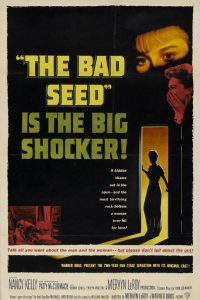
Save your snobbery for another day, my friends — 1956’s The Bad Seed is world-class entertainment; the sort of melodramatic feast no longer made unless stuffed with irritating irony. Director Mervyn LeRoy has crafted a blissfully over-the-top (and deadly serious) rampage of drunken fits, spiteful killings, and waves of bitter tears, all with a little pop psychology thrown in the mix. Are “bad” people born, not made? What can be done with a child who kills without conscience? Does environment really trump DNA? While far from the last word on the subject, The Bad Seed imagines a young girl named Rhoda (pigtailed devil spawn Patty McCormack) who, despite having a loving mother and all the trappings of wealth and comfort, murders unsuspecting children and neighbors who get a little too close to the truth. Seemingly all sweetness and light, Rhoda usually turns on a dime, manipulating the gullible and the well-meaning so that by the end, the entire town seems under her spell. Even her mother helps cover up her crimes.
Eugene O’Neill it ain’t, but what a collection of Method-worthy performances! Nancy Kelly (as Christine, Rhoda’s mother) is hysterical when she isn’t desperate, and Henry Jones (as Leroy, the resident know-it-all ne’er-do-well) is sublime as a man who sees right through Rhoda’s games, only to meet with her special brand of justice. But standing above them all is Eileen Heckart as Hortense, the pitiful drunk who loses her young son to Rhoda’s sadistic desires. She was criminally robbed of an Oscar, for Heckart — a fine actress who just happens to play distraught with the flair of a female Brando — steals each and every scene she’s in. She’s captivating, gracious, sympathetic, and unnerving all at once, and I would have been content to watch her rail about her condition for hours on end. She’s one of the few characters I’d like to slap repeatedly across the face at the same time I pulled her in for an understanding hug.
Unfortunately, little Rhoda fails to get away with anything, as what can only be interpreted as “divine justice” literally strikes her down in the end. Still, despite the pat conclusion, I had built a loving attachment to the little snot; a genuine symbol of unrepentant evil to be admired through the ages. In many ways, she’s a commentary on childhood itself, for what else are the little buggers but tornadoes of selfish id, craving immediate gratification with the lust of animals in heat? And just in case you think I am taking a single viewing too far, I caught it yet again on TV the other night. Before I knew what hit me, I had watched nearly half an hour. The verdict? It’s as good as I thought. Fuck it, man; it’s better.